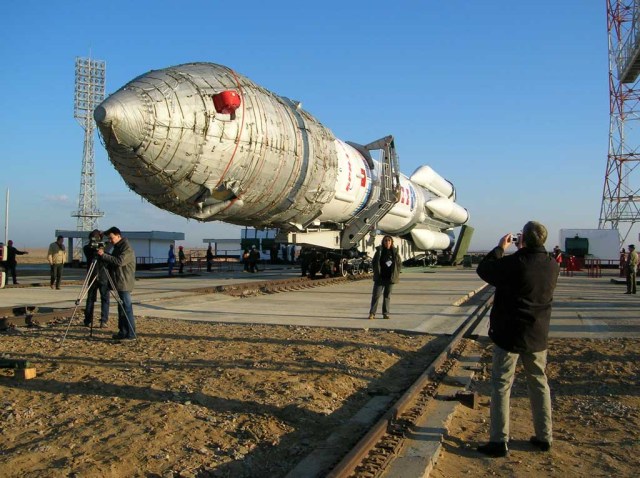Failure to Launch: Russian Rocket Crashes Moments After Liftoff
Three satellites on board destroyed, toxic fuel released over Kazakhstan

A space-bound rocket carrying three navigational satellites crashed back to the ground only seconds after its launch from Russia’s space launch facility near Baikonur, Kazakhstan on Tuesday. No casualties or immediate dangers have been reported in the destruction of the unmanned Proton rocket, but the accident, one more in a series of mishaps, could spell trouble for Russia’s space program and damage relations between Russia and Kazakhstan, where Russia leases the site of its rocket launches.
The rocket’s engines reportedly shut off 17 seconds after launch due to an emergency safeguard activating, causing it to veer off to the side, catching fire, and crashing near the launch site. The rocket was filled with heptyl, a toxic rocket propellant, and photographs taken from Baikonur show a reddish-brown cloud forming. Residents of the nearby city of 70,000 were told to stay inside According to Talgat Musabayev, head of Kazakhstan’s space agency, the fiery explosion burnt out much of the fuel, and rain dispersed the rest, hopefully reducing the environmental consequences.
The 700-ton Proton-M booster rocket was supposed to bring three satellites worth an estimated $200 million into orbit where they would form part of Russia’s Glonass navigation system, which would play the same role as the U.S. controlled Global Positioning System. Russia has had a number of failures in its space program lately, including four Proton-M crashes in the past three years and a failed Phobos probe last year.
Since the end of the Space Shuttle program, the International Space Station is dependent on Russian Soyuz launches for bringing astronauts and cosmonauts to and from orbit, including a crew change scheduled to launch from Baikonur on September 24th. Russian launches also play a heavy role in resupplying the station, and the accident will put a hold on a cargo delivery of water and supplies planned for later this month. While Russia continues to set ambitious goals for its space program, technical errors, corruption, and misfortune have given it a hard time lately.
(via New York Times and Voice of America, image via alexpgp)
- A Russian rocket that exploded last August left hundreds of fragments in low orbit
- The Russian meteor from February sent a shockwave twice around Earth
- SpaceX Dragon docked with ISS, showing promise for commercial spaceflight
Have a tip we should know? tips@themarysue.com